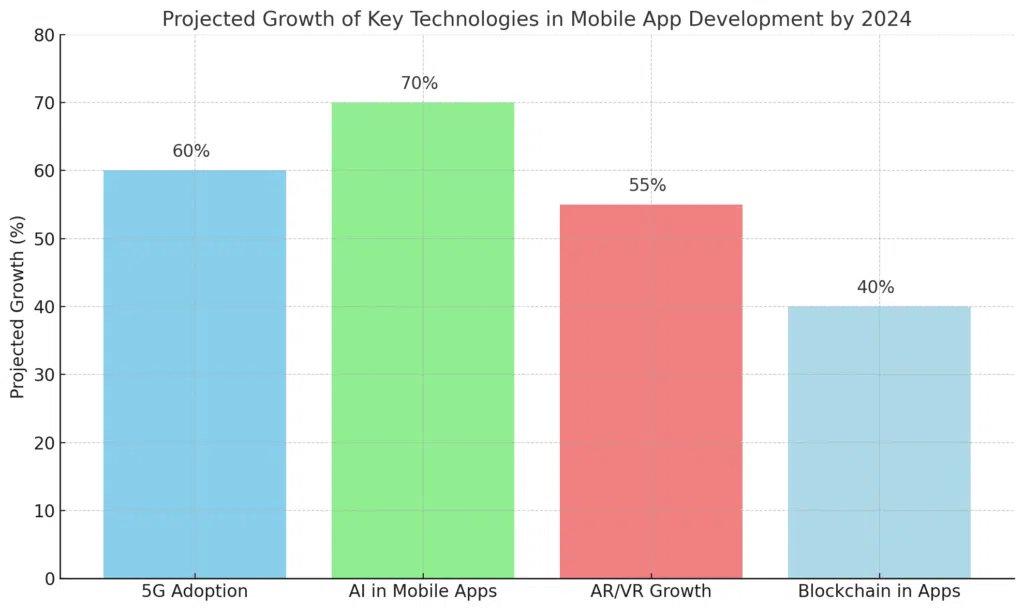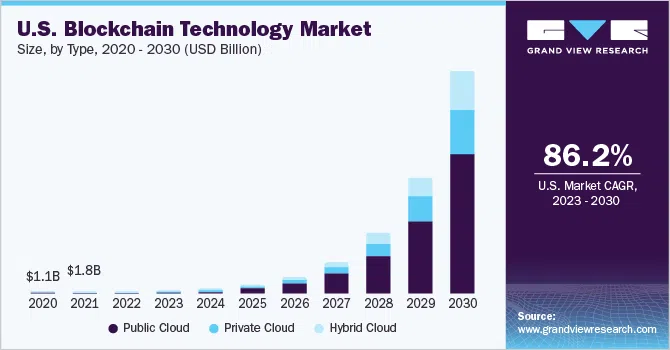Top Mobile App Development Trends to Watch in 2025

As mobile technology continues to evolve at a rapid pace, staying ahead of the curve has become essential for businesses looking to capture user attention, provide seamless experiences, and innovate in the crowded app market. Mobile apps have become integral to daily life, from entertainment and communication to shopping, finance, and healthcare. With this reliance comes the need for apps that meet rising user expectations, integrate cutting-edge technologies, and offer high levels of security and personalization. The global mobile app market generated $935 billion in revenue by 2023, underscoring the immense opportunities available to businesses that prioritize innovation in app development. The mobile app development trends for 2025 will focus heavily on leveraging 5G, AI, blockchain, and more to deliver these seamless experiences, giving businesses an edge in user engagement and loyalty. Partnering with a leading software development company can help businesses leverage the mobile app development trends for 2025 to deliver seamless experiences, giving them an edge in user engagement and loyalty.
The Mobile App Development Landscape: Why Trends Matter
Mobile app development trends offer businesses a roadmap for success, ensuring they stay competitive in a rapidly changing market. A robust and forward-thinking mobile strategy requires the ability to adapt to emerging trends and technologies, as failure to do so can result in loss of users or market relevance. For example, incorporating AI-driven personalization and blockchain-enhanced security has become critical in industries such as e-commerce and fintech.
In 2025, app developers must remain flexible and ready to pivot as new technologies reshape the industry. To succeed, it is essential to pay attention to how advancements such as 5G, AI, AR/VR, and blockchain are influencing not only app functionality but also the broader user experience. According to a report from Data.ai, consumers spent more than 4.1 hours per day on mobile apps in 2023, a 16% increase from the previous year. This demonstrates the growing importance of creating apps that cater to users’ evolving needs and preferences.
Key Mobile App Development Trends for 2025
Here is a bar chart illustrating the projected growth of key technologies in mobile app development by 2025. AI in mobile apps is expected to see the highest growth at 70%, driven by its role in personalization and automation. 5G adoption is projected to grow by 60%, enabling faster, more responsive apps. AR/VR technologies are set to grow by 55%, boosting immersive app experiences, while blockchain in apps is anticipated to expand by 40%, enhancing security and transparency in transactions. These trends highlight the significant role of emerging technologies in shaping the future of mobile applications.

Source: Statistics, Gartner, GSMA
1. 5G Technology: Unlocking New Potential for Mobile Apps
5G has been one of the most anticipated advancements in telecommunications, and its rollout is finally making a substantial impact on mobile app development. With data transmission speeds up to 100 times faster than 4G, 5G allows developers to create more complex, feature-rich apps that enhance user experiences without the latency issues or bandwidth limitations seen in previous generations.
By 2024, the number of 5G connections is expected to surpass 1 billion worldwide . This growth opens up new possibilities for mobile apps, especially those involving augmented reality (AR), virtual reality (VR), and the Internet of Things (IoT). Industries such as gaming, entertainment, and retail are expected to see significant advancements in app capabilities, enabling real-time interactions and higher-quality content streaming.
For instance, AR apps that enable users to visualize products in real-world environments—such as IKEA’s Place app—will benefit from the ultra-low latency and high data speeds of 5G. Similarly, 5G will enable more immersive mobile gaming experiences with real-time multiplayer features and enhanced graphics.
While 5G is expected to revolutionize app performance, businesses must prepare for potential challenges, such as ensuring app compatibility with 5G networks and investing in infrastructure upgrades. Additionally, with more data being transmitted over mobile networks, there will be a heightened need for robust security measures to protect user data and ensure privacy.
2. Artificial Intelligence (AI) and Machine Learning (ML): Powering Smarter Apps
AI and ML have been transforming mobile apps for several years, but in 2025, we’ll see these technologies being used in increasingly sophisticated ways. AI and ML enable apps to analyze user behavior, provide personalized recommendations, and even predict user needs based on historical data. The rise of AI-powered features has led to a surge in app engagement and user satisfaction.
By 2024, the global AI market is expected to reach $190.61 billion, with AI being integrated into 70% of the mobile apps available . Mobile apps that incorporate AI can improve user experiences through natural language processing (NLP), voice recognition, facial recognition, and real-time data analytics. AI is particularly beneficial for sectors like retail, where personalized recommendations based on user preferences can boost sales and customer loyalty.
For example, AI is at the heart of recommendation engines in apps like Netflix and Spotify, helping users discover new content based on their preferences and past behavior. AI chatbots, commonly used in customer service apps, are expected to become more advanced, offering human-like interactions and solving user problems in real-time.
While AI offers immense benefits for improving app functionality and user satisfaction, developers must also address the ethical implications of AI, particularly regarding user privacy and data collection. Businesses must ensure transparency in how they use AI to analyze user data and develop clear policies for data security.
3. Augmented Reality (AR) and Virtual Reality (VR): Enhancing User Interaction
AR and VR technologies are set to take center stage in 2024, especially as mobile devices become more capable of supporting immersive experiences. AR and VR apps are not just limited to entertainment and gaming; they are also making headway in industries such as retail, healthcare, and education.
According to a report by MarketsandMarkets, the global AR and VR market is projected to grow from $37 billion in 2023 to $114.5 billion by 2027. With such a massive increase in adoption, developers must start integrating AR and VR into their apps to offer interactive, engaging experiences that go beyond traditional app interfaces.
AR apps, like those used for virtual home tours in real estate or virtual try-on features in fashion, are becoming increasingly popular as they offer practical solutions for remote shopping and decision-making. Meanwhile, VR apps are being used for virtual training and simulations in industries like manufacturing and healthcare, offering users hands-on experiences in a safe, controlled environment.
Despite the exciting possibilities of AR and VR, these technologies come with challenges, including high development costs, user hardware limitations, and the need for seamless integration with existing app ecosystems. Developers need to strike a balance between delivering immersive experiences and ensuring that apps remain accessible to users with standard devices.
Have a Project Idea in Mind?
Get in touch with Savvycom’s experts for a free consultation. We’ll help you decide on next steps, explain how the development process is organized, and provide you with a free project estimate.
4. Blockchain Technology: Enhancing Security and Transparency
As mobile apps increasingly handle sensitive data, security has become a top priority for developers and users alike. Blockchain technology, known for its decentralized and transparent nature, is emerging as a key solution for improving security in mobile apps, particularly in fintech, healthcare, and supply chain management.
The global blockchain market is expected to grow to $39.7 billion by 2025 with a AAGR of 86.2% from 2023 to 2030, driven by demand for secure and transparent transactions. In mobile app development, blockchain can be used to create decentralized apps (dApps) that ensure the integrity of data exchanges, eliminate intermediaries, and protect user information from hacking or tampering.

Source: Grand View Research
For example, blockchain-based payment apps are becoming popular as they offer enhanced security for peer-to-peer transactions, eliminating the need for centralized payment gateways. Blockchain is also being used in healthcare apps to secure patient data and enable safe sharing of medical records between providers.
While blockchain holds significant promise for improving mobile app security, there are still barriers to widespread adoption, including regulatory uncertainty, high development costs, and challenges with scalability. However, as more industries recognize the benefits of blockchain, we expect to see a growing number of blockchain-powered mobile apps in the coming years.
5. Super Apps: One-Stop Solutions for Multiple Services
Super apps, which integrate multiple services into one platform, are becoming increasingly popular in regions like Asia and are expected to expand globally in 2024. These apps allow users to access a wide range of services—such as messaging, payments, food delivery, and shopping—without needing to switch between different apps.
According to a report by TechCrunch, the rise of super apps is fueled by user demand for convenience and efficiency . The most well-known example of a super app is WeChat, which allows users to chat, shop, pay bills, and book rides, all from within the same app. In 2025, more companies will follow this model, creating super apps that consolidate multiple functionalities into one user-friendly experience.
Super apps offer enormous potential for businesses looking to engage users and increase brand loyalty. However, developing a super app requires a robust infrastructure, excellent user experience design, and the ability to maintain performance across various services. Businesses must also be mindful of data security concerns, as super apps collect vast amounts of user data across different services.
How Savvycom Can Help You Leverage Mobile App Development Trends
As a leading software development company, Savvycom is dedicated to helping businesses embrace the future of mobile app development by integrating cutting-edge technologies like AI, blockchain, AR, and 5G. Whether you’re looking to build a super app, develop a blockchain-powered payment system, or enhance your mobile app with AI-driven personalization, Savvycom’s experienced team of developers can deliver high-quality, scalable solutions.
Savvycom offers a comprehensive range of Mobile App Development Services tailored to meet the unique needs of each client. With expertise in emerging trends and a deep understanding of user behavior, Savvycom can help your business stay ahead of the competition and create innovative apps that drive engagement and success.
Frequently Asked Questions (FAQs)
What are the key mobile app development trends for 2024?
The key trends include the integration of 5G technology, AI and machine learning, augmented reality (AR) and virtual reality (VR), blockchain for security, and the rise of super apps that consolidate multiple services into one platform.
How does 5G technology impact mobile app development?
5G technology significantly enhances app performance by offering faster data transmission speeds, lower latency, and higher bandwidth, enabling developers to build more complex, feature-rich apps.
Why is AI important in mobile app development?
AI enables apps to analyze user behavior, provide personalized recommendations, and predict user needs, leading to more engaging and satisfying user experiences.
What are the benefits of using blockchain in mobile apps?
Blockchain enhances mobile app security by providing decentralized and transparent data exchanges, protecting sensitive user information, and ensuring the integrity of transactions.
How can Savvycom help my business stay ahead in mobile app development?
Savvycom offers a range of mobile app development services, from building super apps to integrating AI, blockchain, and 5G technologies. Their team of experienced developers can help your business create innovative, high-performing mobile apps that meet user expectations and drive success.
You said:
Tech Consulting, End-to-End Product Development, Cloud & DevOps Service! Since 2009, Savvycom has been harnessing digital technologies for the benefit of businesses, mid and large enterprises, and startups across the variety of industries. We can help you to build high-quality software solutions and products as well as deliver a wide range of related professional services.
Savvycom is right where you need. Contact us now for further consultation:
- Phone: +84 24 3202 9222
- Hotline: +1 408 663 8600 (US); +612 8006 1349 (AUS); +84 32 675 2886 (VN)
- Email: [email protected]


